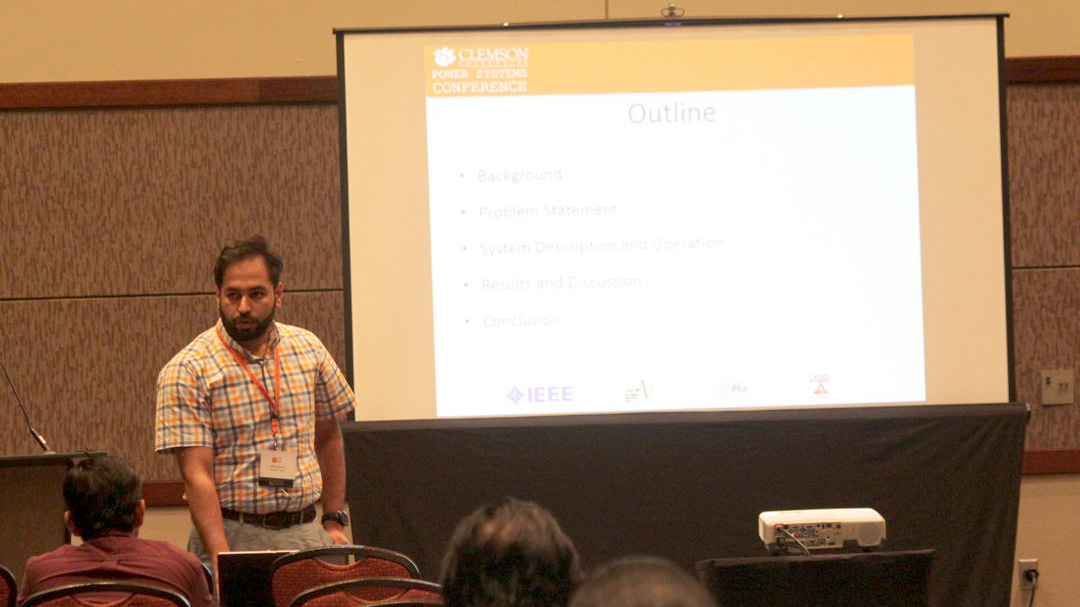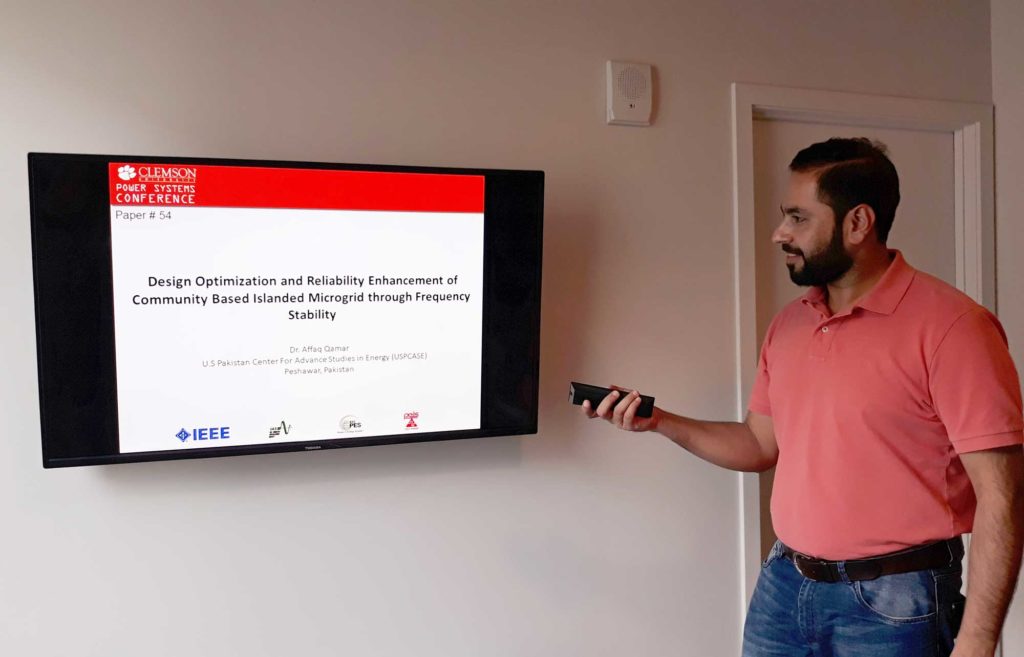USPCASE exchange faculty papers presented at IEEE Power Systems Conference

USPCASE exchange faculty papers presented at IEEE conference in U.S.
Five USPCASE projects presented at 16th Power Systems Conference
The presented research conveyed the practical implications and research gaps in the modeling, simulation and physical deployment of hybrid microgrid systems in remote areas of Pakistan.
The U.S.-Pakistan Centers for Advanced Studies in Energy are conducting research that directly relates to on-going and anticipated challenges in the energy sector, challenges that affect the lives of Pakistanis and impede economic growth. Under the USAID-funded program, research funding is provided to academic researchers at UET Peshawar and NUST along with ASU faculty and Pakistani industry partners to jointly conduct energy-related research that will address Pakistan’s energy future.
Dr. Affaq Qamar, assistant professor at USPCASE UET Peshawar, works in the areas of power systems and power electronics and is currently an exchange scholar at ASU. He presented five papers at the 16th Power Systems Conference organized by Clemson University in collaboration with the IEEE Power and Energy Society and other prominent energy sector organizations.
The conference “Smart Grid Technologies and Innovation” was held in Charleston, South Carolina, from September 4-7, 2018. The conference provided an opportunity for electric power industry experts, electric utilities, government agencies and academic researchers to present and exchange new ideas to elevate the state-of-the-art in power engineering.
The collaborative research titled “Hybrid Energy Test-Bed for Remote Communities — Integration of Solar, Biomass and Microhydro Generator” was conducted by faculty from USPCASE UET Peshawar including Dr. Shoaib Khalid, Dr. Abdul Basit and Dr. Affaq Qamar, with Dr. Govindasamy Tamizhmani from ASU as the research lead. USPCASE master’s students from the Electrical Energy System Engineering stream were also actively engaged in the ongoing research as part of their theses and term projects.
The presented research conveyed the practical implications and research gaps in the modeling, simulation and physical deployment of hybrid microgrid systems in remote areas of Pakistan. The reliance on a microgrid system over a single or few renewable sources results in intermittency problems. Therefore, a hybrid generation approach was used in the proposed microgrid architecture to provide continuous electrical power in a cost-effective manner to off-grid remote areas.
The papers highlighted various approaches for the appropriate modeling of a PV, microhydro and biomass-based interconnected microgrid system in combination with energy storage element schemes and controls to maintain the steady supply of energy to meet load demands.
A novel distributed control scheme was also presented to control the frequency and voltage fluctuations and to prevent damage to attached equipment and residential appliances.
An analysis of the results was shared with attendees, showing the dynamic performance of microhydro and PV after the occurrence of transient disturbances due to a quick change in electric load. The presented work suggested the use of solar PV and microhydro as the primary sources to serve load demand, with biomass and battery provides backup in peak hours.
The research found that the use of a battery bank reduces biomass operation thereby reducing the system’s net present cost (NPC) and levelized cost of electricity (LCOE) to make it more economically feasible and reliable.
The fully automatic hybrid microgrid system fulfilling the peak demand of 25KW load is deployed in a village near the district Mardan of Khyber Pakhtunkhwa, Pakistan.
The system is now going through a rigorous testing and validation phase. The research team strongly believes that the outcomes of this research will provide a viable case study that the research can be replicated in various parts of the country to provide access to electricity in an environmentally friendly and cost-effective way.
The presentations:
- Rizwan Kamal, Muhammad Younas, Muhammad Shoaib Khalid, Affaq Qamar, “Cost Optimization of an Off-Grid Hybrid Renewable Energy System with Battery Storage for Rural Electrification in Pakistan”
- Muhammad Salman, Abdul Basit, Muhammad Shoaib Khalid, Affaq Qamar, “Reduction in Total Harmonic Distortion of Cascaded H-Bridge Multilevel Inverter with Equal Phase Method”
- Khurram Shahzad, Azmat Rashid Khan, Muhammad Shoaib Khalid, Affaq Qamar, “Voltage and Frequency Control of PV, Micro-hydro and Biomass-Based Islanded Microgrid”
- Muhammad Younas, Rizwan Kamal, Muhammad Shoaib Khalid, Affaq Qamar, “Economic Planning for Remote Community Microgrid Containing Solar PV, Biomass Gasifier and Microhydro”
- Azmat Rashid Khan, Khurram Shahzad, Muhammad Shoaib Khalid, Affaq Qamar, “Design Optimization and Reliability Enhancement of Community Based Islanded Microgrid through Frequency Stability”
